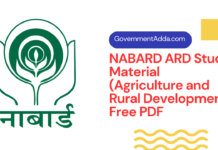Agronomy is derived from a Greek word ‘agros’ meaning ‘field’ and ‘nomos’ meaning ‘management’. Principles of agronomy deal with scientific facts in relations to environment in which crop are produced.
Definition of Agronomy :-
1. It is defined as an agricultural science deals with principles and practices of crop production and field management.
2. Agronomy is branch of agricultural science, which deals with principles, & practices of soil, water & crop management.
3. It is branch of agricultural science that deals with methods which provide favorable environment to the crop for higher productively,
Scope of Agronomy
Agronomy is a dynamic discipline with the advancement of knowledge and better understanding of planet, environment and agriculture. Agronomy science becomes imperative in Agriculture in the following areas.
- Identification of proper season for cultivation of wide range of crops is needed which could be made possible only by Agronomy science.
- Proper methods of cultivation are needed to reduce the cost of cultivation and maximize the yield and economic returns.
- Availability and application of chemical fertilizers has necessitated the generation of knowledge to reduce the ill-effects due to excess application and yield losses due to the unscientific manner of application.
- Availability of herbicides for control of weeds has led to development for a vast knowledge about selectivity, time & method of its application.
- Water management practices play grater role in present day crisis of water demand and Agronomy science answer to the questions ‘how much to apply?’ and ‘when to apply?’.
- Intensive cropping is the need of the day and proper time and space intensification not only increase the production but also reduces the environmental hazards.
- New technology to overcome the effect of moisture stress under dry land condition is explored by Agronomy and future agriculture is depends on dry land agriculture.
- Packages of practices to explore full potential of new varieties of crops are the most important aspects in crop production which could be made possible only by Agronomy science.
- Keeping farm implements in good shape and utilizing efficient manner to nullify the present day labour crisis is further broadening the scope of agronomy.
- Maintaining the ecological balance through efficient management of crops, livestock and their feedings in a rational manner is possible only by knowing agronomic principles.
- Care and disposal of farm and animal products like milk and eggs and proper maintenance of accounts of all transactions concerning farm business is governing principles of agronomy.
Relation of agronomy to other sciences
Agronomy is a main branch of Agriculture. It is synthesis of several disciplines like soil science, Agricultural chemistry, crop physiology, plant ecology, biochemistry and economics.
♦ The Soil Science helps the agronomist to thoroughly understand the soil physical, chemical and biological properties to effect modification of the soil environment.
♦ The Agricultural Chemistry help the agronomist to understand the chemical composition and changes involved in the production, protection, and use of crops and livestock.
♦The crop physiology helps to understand the basic life process of crops to understand functioning of each parts of plant to determine their input requirement like nutrients etc.
♦ The plant ecology helps us to understand the associated environment in which the crops grown like the influence of weather (Temperature, Rainfall etc).
♦The biochemistry shows the way in which biochemical process takes place in crops which helps to understand critical requirements to favourably activate this process.
♦ The economics paves the way for profit and loss analysis in farming.












